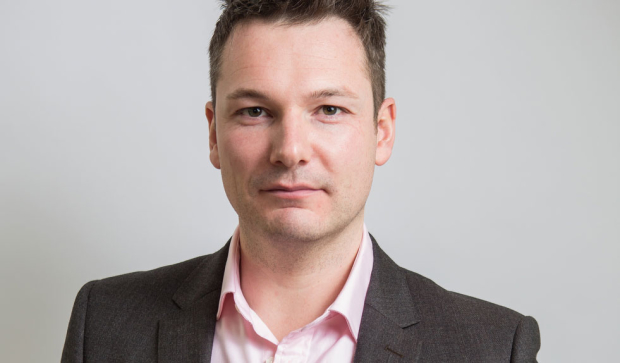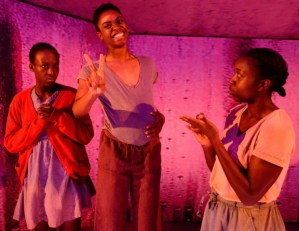Steve Atkinson: HighTide started on a wave of changes in new writing
As HighTide Festival turns ten, we talk to artistic director Steve Atkinson on what has made the new writing event such a success

HighTide turns ten this year and the UK’s premier new writing festival could not be in better shape. Since beginning in the small market town of Halesworth in Suffolk, they’ve championed the likes of Adam Brace, Sam Holcroft, Joel Horwood and Nick Payne, often staging debuts from those writers well before theatres like the National, Almeida and the Royal Court pick them up. As co-founder of the festival, director Steve Atkinson has been instrumental in pushing the festival artistically so it now stands as one of the most important new writing events in the UK calendar. Now, after they open at the festival's home of Aldeburgh, HighTide plays tour up and down the country, bringing bright, dynamic theatre voices to the rest of the world.
It feels as though the festival has always been ahead of the game on new writing, even when it began ten years ago…
Looking back, even in our second year in 2008 we did Adam Brace’s play Stovepipe and alongside that we also had Nick Payne’s first play, Joel Horwood’s second play and a play by a really great writer-director called Emily Watson-Howes. It was an incredibly fortunate year.
Has the new writing culture changed in the industry?
Back when we began it was very different. Ian Rickson was at the very end of his time running the Royal Court. I think it was a popular feeling that although Ian was very good at supporting new plays by people like Roy Williams or Simon Stephens, his focus wasn’t specifically new writers. And it was similar at the Bush Theatre. Mike Bradwell was artistic director before Josie Rourke began running it. Then Josie, Dominic Cooke at the Court and HighTide all happened in the same year. Josie came to see Joel's I Caught Crabs in Walberswick and said: "Let’s do it at the Bush". It was a totally alien idea that one of our plays would go on at the Bush.
The National Theatre also nearly staged Adam Brace’s Stovepipe in the Cottesloe…
Yes it was originally going to go in rep with Gethsemane, but logistical issues – it was a promenade piece – meant the National decided they would put it in the brochure and help us to sell the tickets, but not actually pay for it. It was a choice of: you can do it and we’ll do it with you or we won’t do it at all. So we went for it, but I remember being about a month away from opening and we had a massive cash flow issue. I wrote to Nick Hytner and Nick Starr, who I hadn’t actually met yet, to ask if they knew of anyone who might be able to help. I immediately got an email back telling me to come into the office. I thought: "Oh great, they are going to open up their address book for us". I remember walking into Hytner’s office and the first thing he said to me was: "Are you fucking kidding me: you don’t have the money?" I was 23 and it was a big lesson in producing.
Has it got easier?
At the beginning of HighTide it was very difficult to convince artistic directors that new writers were any good. The whole point of HighTide was that we would do them. Now time has gone on and the festival has continued to change. We’re now able to partner with people to put the shows on. That wasn’t originally the case. But there are still challenges, they are just different.
What’s your vision for the future of HighTide?
This year we tested a residency as a creative process in Aldeburgh. We asked writers to go out to Aldeburgh for a couple of weeks and write a play, which makes up a piece in this year’s festival called The Path. That residency process is a very different way of working. The idea is that you are a resident writer then actors and directors come to join you and there are workshops, readings and feedback sessions. It ends up turning into something like the Humana Festival or the Sundance Festival in the States. A kind of laboratory to develop different plays. It’s more informal.
What's it like having a festival in a place like Aldeburgh?
We don’t really perform in theatres, in some instances they are shops turned into theatres. There is a big hall in Aldeburgh called the Jubilee Hall which is where Benjamin Britten started Aldeburgh Festival from. He premiered A Midsummer Night’s Dream there. Aldeburgh has a lovely seafront, restaurants, hotels and galleries. Then you’ve got the marshes and the sea. It’s rejuvenating.
When you started ten years ago what were you hoping for?
I hoped it would become a touring company which it is. I hoped the festival would be a spring board for things to go out somewhere else. We all hoped the quality of the plays would be high enough to be seen in other theatres. A real milestone for us is doing a play at the Royal Court – Harrogate by Al Smith is heading there later this year.
What’s your proudest moment?
In the first festival in 2007 all four productions went into rehearsal in the same day. We did the meet and greet with what must have been 50 artists, maybe more. And we had to collectively pitch to them that it was going to be a really great six weeks. That initial getting everyone on board was really exciting.
HighTide Festival runs until 18 September. Pilgrims runs at the HighTide festival until 17 September, then at the Yard Theatre, London from 20 September to 16 October. It then runs at Theatr Clwyd from 18 to 29 October. Girls runs at the HighTide Festival until 17 September, then at Soho Theatre from 27 September until 29 October.














